Lies, Non-Truths, Falsehoods and Misleading Statements: The Revisionist History of Trump's Team
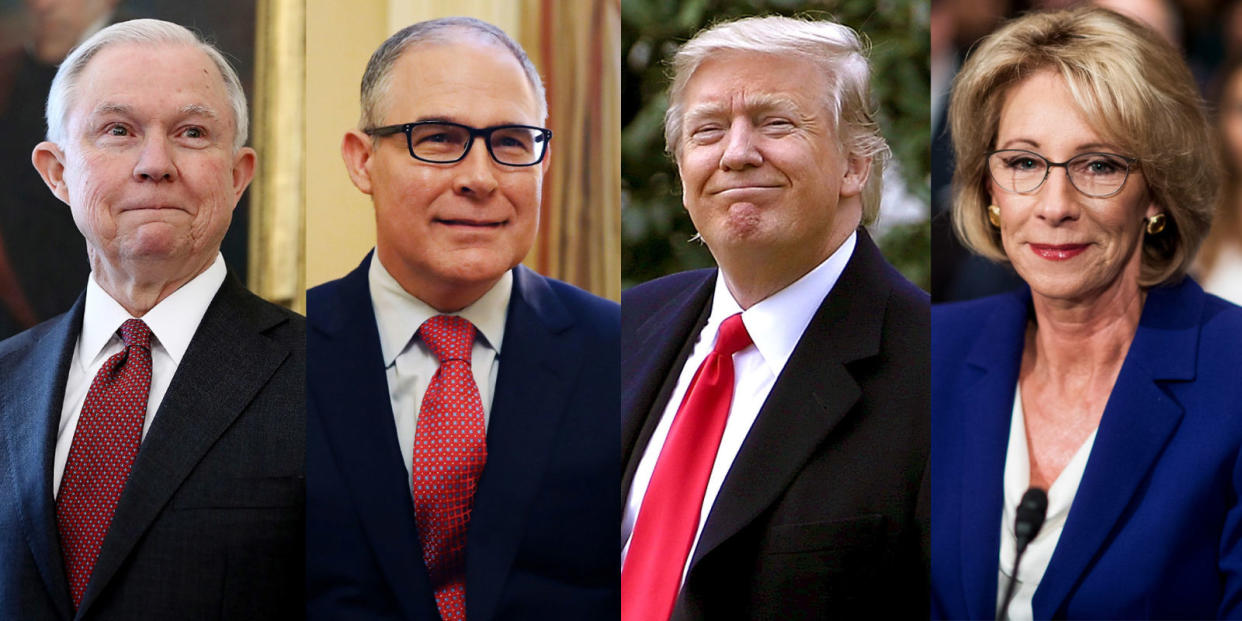
Senator Al Franken of Minnesota said Tuesday that he now believes Attorney General Jeff Sessions is guilty of perjury. Sessions isn't the only member of President Trump's operation to be accused of producing falsehoods to a congressional committee, however. Below are 10 core members of Trump's team and a sample of the untrue or misleading statements they have made.
Jefferson Beauregard Sessions III
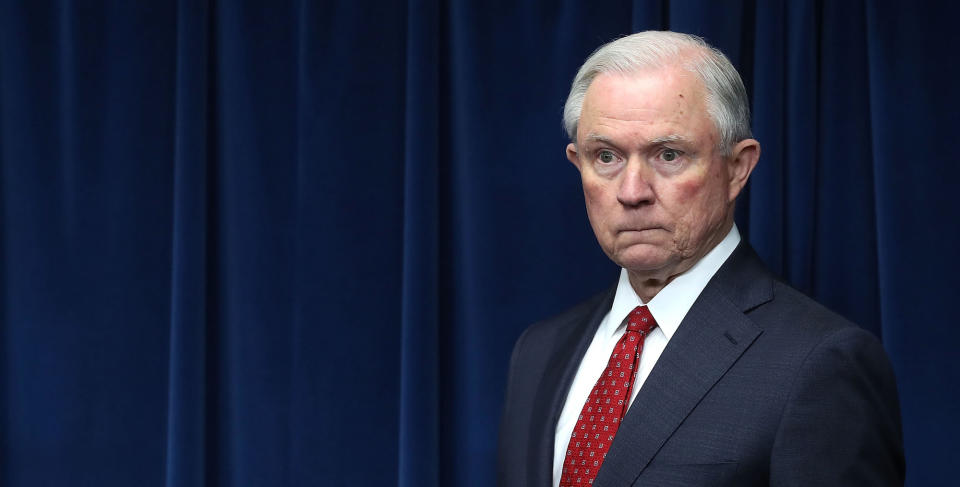
As ProPublica notes, the attorney general took a detour from the question at hand to say something false at his confirmation hearing. Asked by Al Franken about reports that Trump staffers and associates were in contact with Russian officials repeatedly during the campaign, Sessions had this to say:
"Senator Franken, I'm not aware of any of those activities. I have been called a surrogate at a time or two in that campaign and I did not have communications with the Russians."
But a Washington Post report last week found Sessions spoke to Russian Ambassador Sergey Kislyak on two separate occasions during the campaign. Since the report, Sessions and his camp have alternately said he misunderstood the question, that he "did not recall" the specifics of their conversation, and that they only made "superficial comments about election-related news."
However, Sessions responded similarly to a written pre-hearing question about Russian contacts from Senator Patrick Leahy.
He later clarified his testimony to the Senate Judiciary Committee. Senator Franken called that response "insulting," and later made the perjury claim.
Sean Spicer
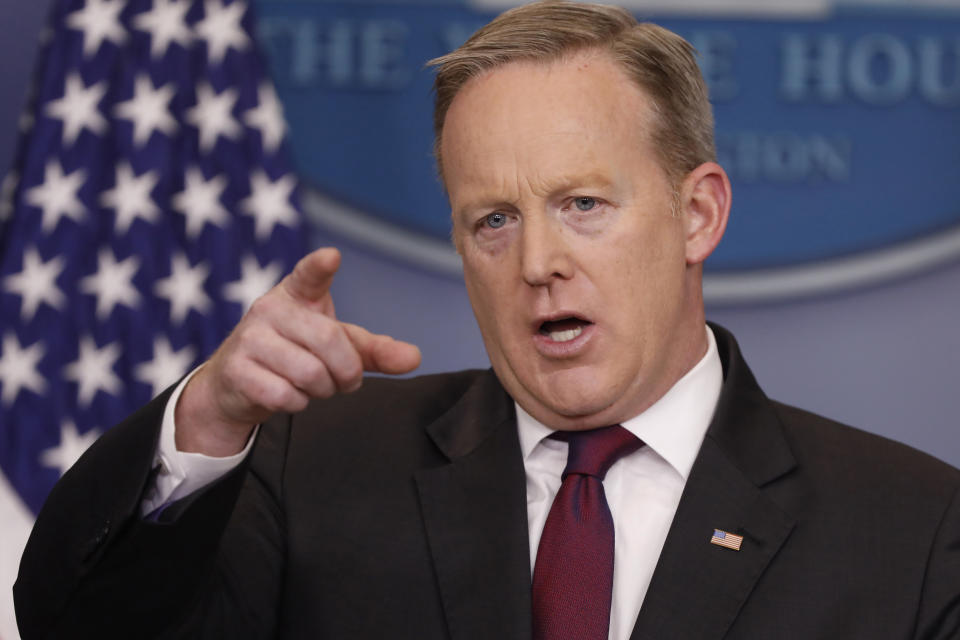
Barely 24 hours into his job as White House Press Secretary, Sean Spicer claimed that his boss' inauguration was "the largest audience ever to witness an inauguration, period." It was not. When CNN's State of the Union turned down the chance to host Spicer's colleague Kellyanne Conway because of issues with her credibility, Spicer subsequently said CNN "walked back or denied" those reports. That was not true. He also cited a terror attack in Atlanta three separate times while defending the travel ban. There was no attack, and Spicer later said he "clearly meant Orlando."
And way back during the campaign, Spicer defended Trump's comments in The Mobile Locker Room to The Weekly Standard by questioning if what Trump described-grabbing women "by the pussy"-was sexual assault. Spicer then accused the Standard of fabricating his quote, so they released the audio of him saying it.
Scott Pruitt

The EPA administrator-and, as Oklahoma attorney general, frequent suer of the EPA-was asked about an issue vital to the nation's conservatives: email.
"Have you ever conducted business using your personal email accounts, nonofficial Oklahoma attorney general email accounts, text messages, instant messenger, voicemails, or any other medium?" Senator Cory Booker asked Pruitt in a pre-hearing questionnaire.
"I use only my official OAG email address and government-issued phone to conduct official business," Pruitt responded.
But in a February 17 report, ProPublica pointed out that Oklahoma City's local FOX 25 News found Pruitt did occasionally use a private account. The report was corroborated by the Associated Press and the Oklahoma attorney general's office. Pruitt could ask for some advice here from Vice President Mike Pence, who railed against Hillary Clinton's use of private email throughout the campaign and also used an AOL account for official business as Indiana governor.
Kellyanne Conway
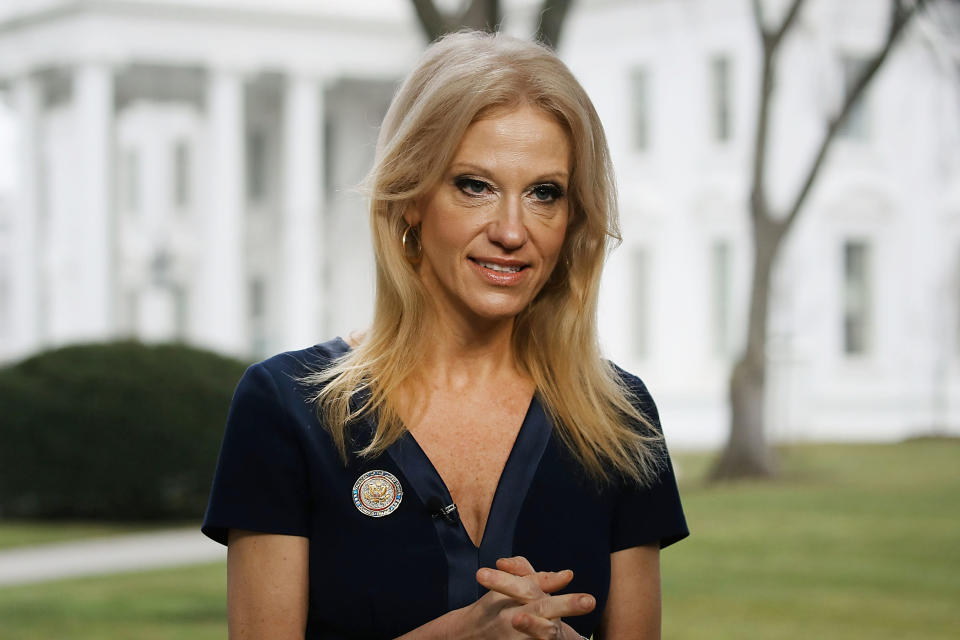
While questions remain as to whether the special counsel to the president believes in the concept of objective truth, she's certainly run afoul of it. The most infamous example was the "Bowling Green Massacre," an entirely fictional terrorist attack Conway referenced in multiple interviews with different outlets. When she was called on it, she said it was "an honest mistake."
Steven Mnuchin
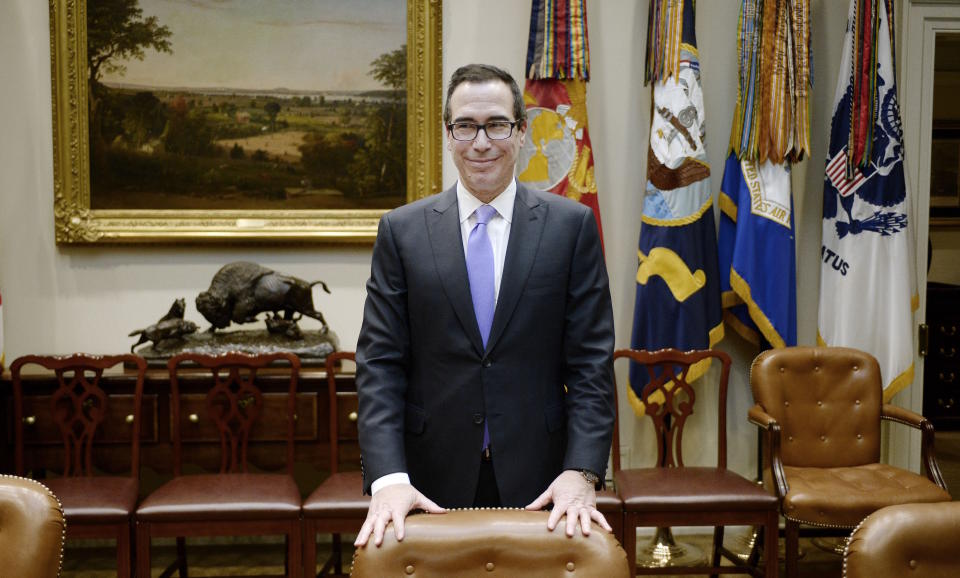
In written pre-hearing testimony, ProPublica notes, the new Treasury Secretary wrote that his former bank, OneWest, did not "'robo-sign' documents" while foreclosing on homes in the aftermath of the Great Recession.
According to The Columbus Dispatch, however, the bank used the practice in Ohio:
But a Dispatch analysis of nearly four dozen foreclosure cases filed by OneWest in Franklin County in 2010 alone shows that the company frequently used robo-signers. The vast majority of the Columbus-area cases were signed by 11 different people in Travis County, Texas. Those employees called themselves vice presidents, assistant vice presidents, managers and assistant secretaries. In three local cases, a judge dismissed OneWest foreclosure proceedings specifically based on inaccurate robo-signings.
Nice. On the way to foreclosing on more than 36,000 homes, OneWest also reportedly foreclosed on a 90-year-old woman over 27 cents.
Stephen Miller
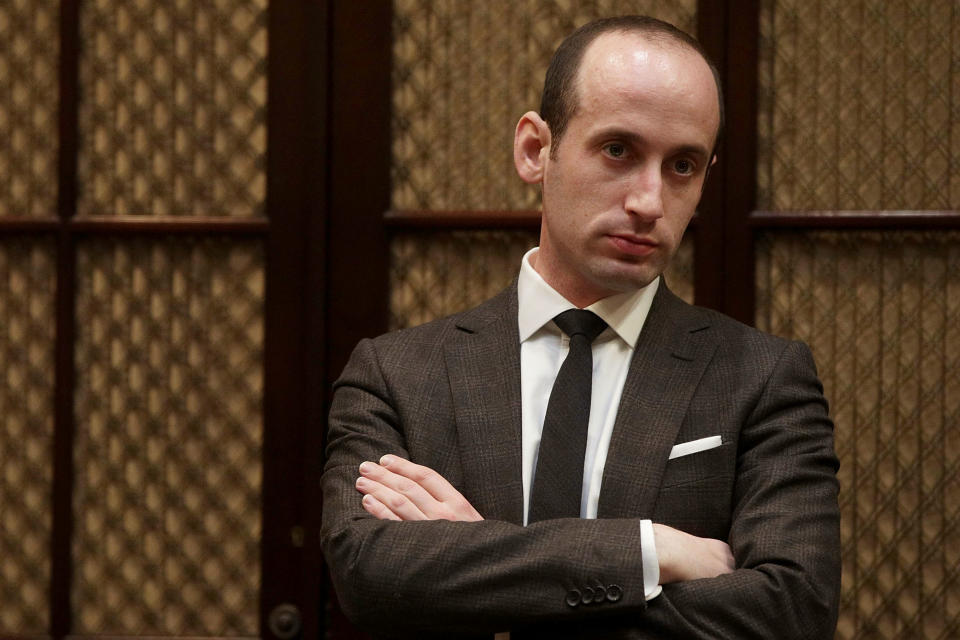
The White House senior adviser's pet topic is voter fraud. He said on the Sunday shows that thousands were bussed into New Hampshire from Massachusetts to vote for Hillary Clinton, a claim first made by former Gov. John Sununu and rated "pants on fire" by Politifact.
He also said that "you have millions of people who are registered in two states or who are dead who are registered to vote. And you have 14 percent of noncitizens, according to academic research, at a minimum, are registered to vote, which is an astonishing statistic." The Washington Post rated Miller's claims false: While one study did show some voter registration records were out of date, the study's author has specifically said it provided no evidence of voter fraud:
We found millions of out of date registration records due to people moving or dying, but found no evidence that voter fraud resulted.
- David Becker (@beckerdavidj) November 28, 2016
Betsy DeVos
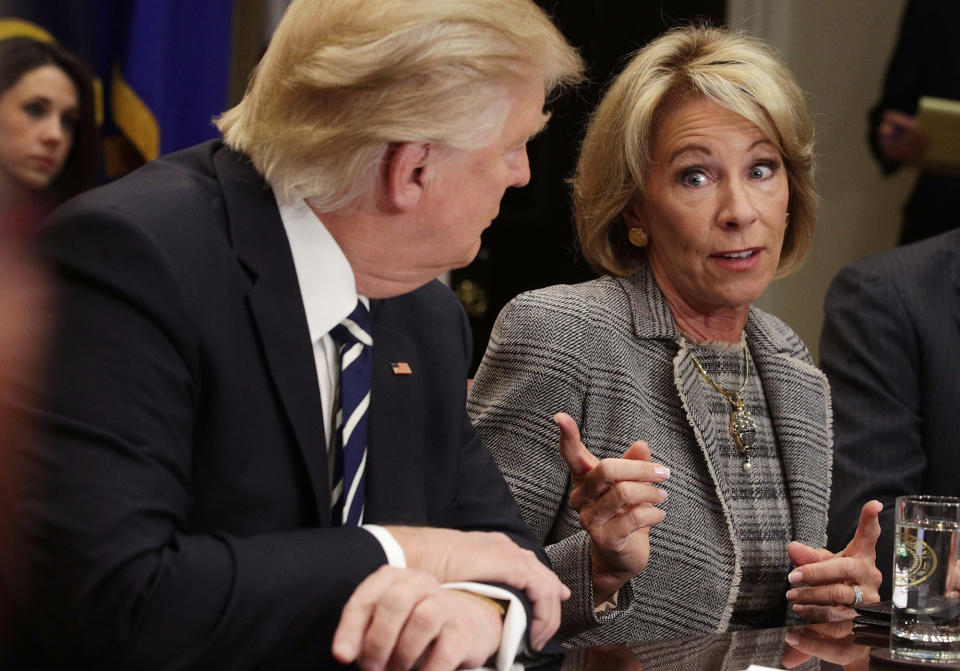
ProPublica reminds us that Senator Kelly Ayotte of New Hampshire suggested the now-Secretary of Education was involved in a family foundation that has provided millions in funding to anti-LGBT groups.
When Democratic Senator Maggie Hassan pointed out that DeVos sits on the board of the foundation, DeVos bluntly replied, "I do not."
As The Intercept found, though, DeVos was listed as a vice president of the foundation on IRS filings for nearly two decades. DeVos called this a clerical error.
Elsewhere, DeVos had some trouble with the numbers. In written pre-hearing testimony, according to NPR, DeVos defended virtual charter schools-where high-school students take all their classes online-in general terms. That was fine, but then she provided some specific data about graduation rates at some of those institutions:
Idaho Virtual Academy (IDV A): 90 percent
Nevada Virtual Academy (NVV A): 100 percent
Ohio Virtual Academy (OHV A): 92 percent
Oklahoma Virtual Charter Academy (OVCA): 91 percent
Texas Virtual Academy (TXVA): 96 percent
Utah Virtual Academy (UTV A): 96 percent
Wisconsin Virtual Academy (WIV A): 96 percent"
As NPR pointed out, all these numbers were wrong. Nevada Virtual, for instance, had a 63 percent rate-not 100. Ohio's was 53, and Utah's was 42. The Trump administration did not respond to NPR's request for comment on the faulty numbers, but they appear to come from a report by the for-profit company that runs these virtual schools.
Reince Priebus
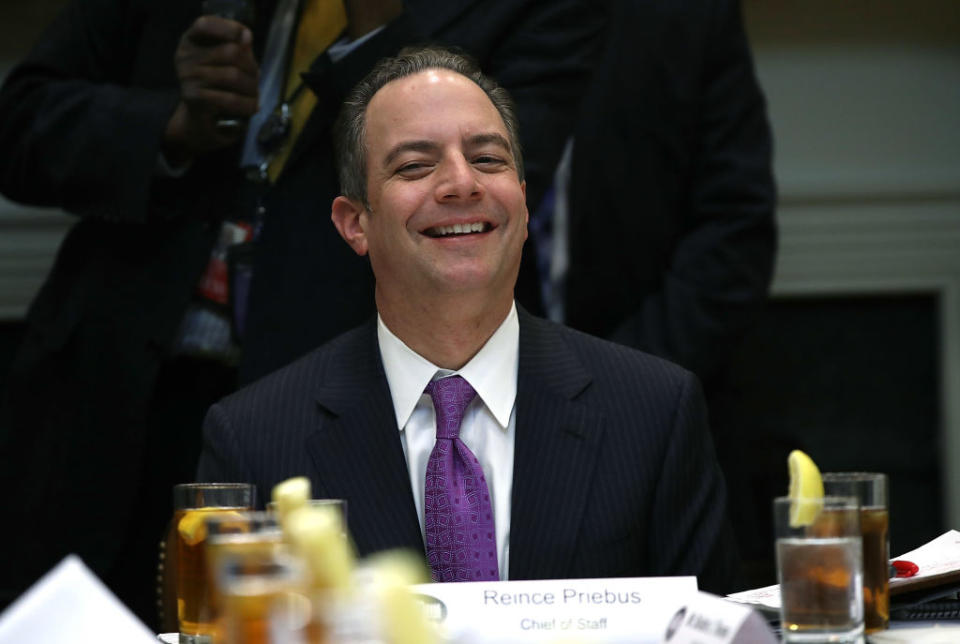
The White House chief of staff, whose name is clearly an anagram, claimed on CBS' Face the Nation in January that John Podesta's email was easy to hack because his password was "password." There is no evidence this is true, so it's unsubstantiated at best.
Rex Tillerson (Maybe)
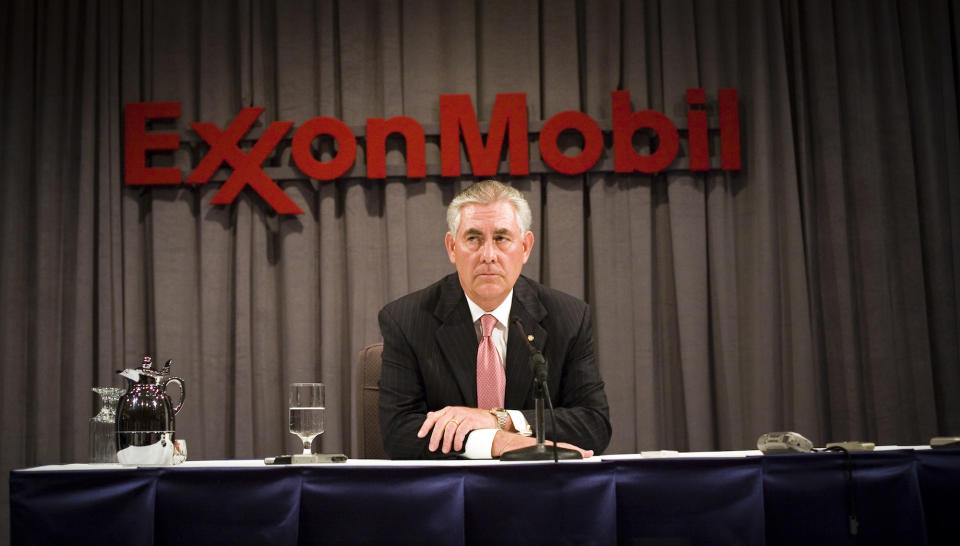
The water is murkier here, but when asked about his history of lobbying against sanctions on Russia, the Secretary of State offered: "I have never lobbied against sanctions. To my knowledge, Exxon never directly lobbied against sanctions."
However, as ExxonMobil's CEO, Tillerson TK would have known about this piece of lobbying, documented by Politifact:
Government lobbying records show that in 2014 and 2015, Exxon paid the Nickles Group over $193,000 to press "issues related to Russian sanctions impacting the energy sector," along with a number of other matters. It paid another $120,000 in 2014 and 2015 to Avenue Solutions for work on a range of issues, including "energy sanctions in the Ukraine and Russia." In the same time frame, according to public logs, Tillerson visited the White House five times to see Jeffrey Zients, director of the National Economic Council. The meetings started about a week after President Barack Obama authorized the first of three rounds of sanctions. Bloomberg reported that Tillerson saw Treasury Secretary Jack Lew seven times in the second half of 2014. The Treasury Department oversees how sanctions are carried out.
Politifact rates Tillerson's answer as "artfully crafted" but "pretty misleading" and, ultimately, "mostly false." Moreover, Foreign Relations Committee Chairman and Republican Bob Corker reminded Tillerson in the hearing that he had called him personally in response to the sanctions. Corker later gave Tillerson a bail-out opportunity, which he took, claiming that "ExxonMobil participated in understanding how the sanctions are going to be constructed," rather than lobbied against them.
You Might Also Like

